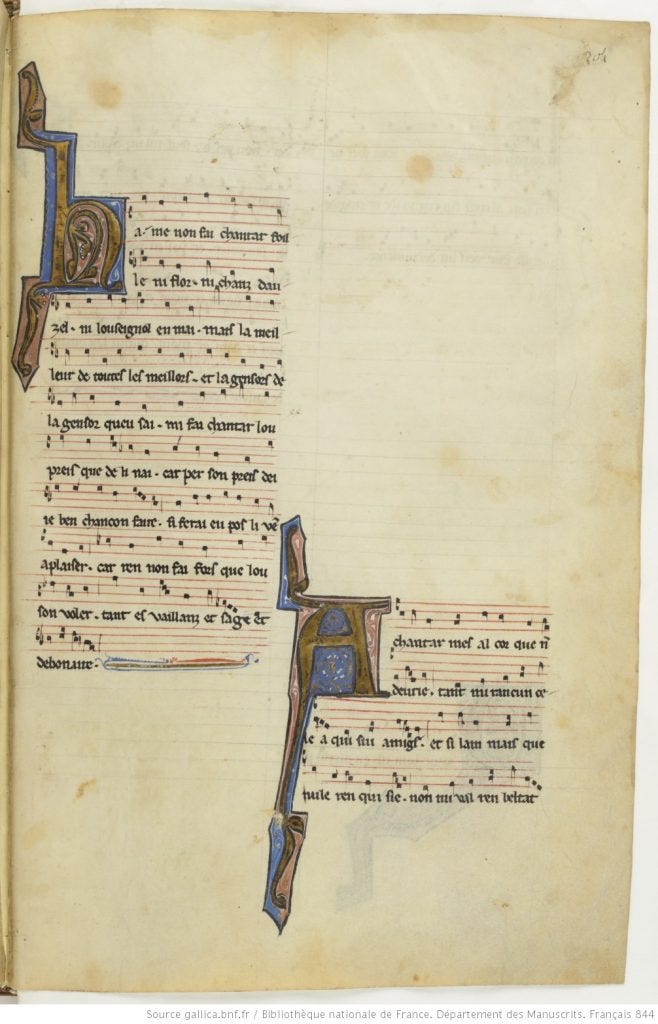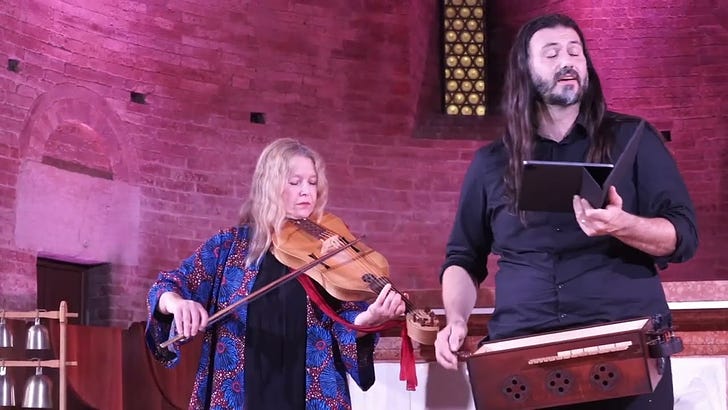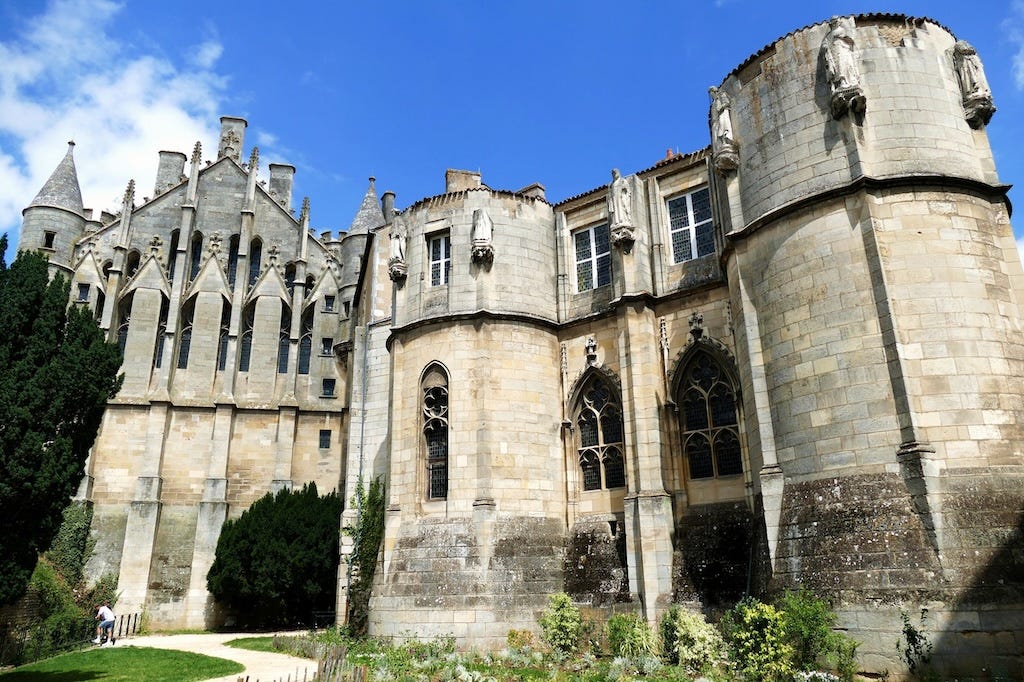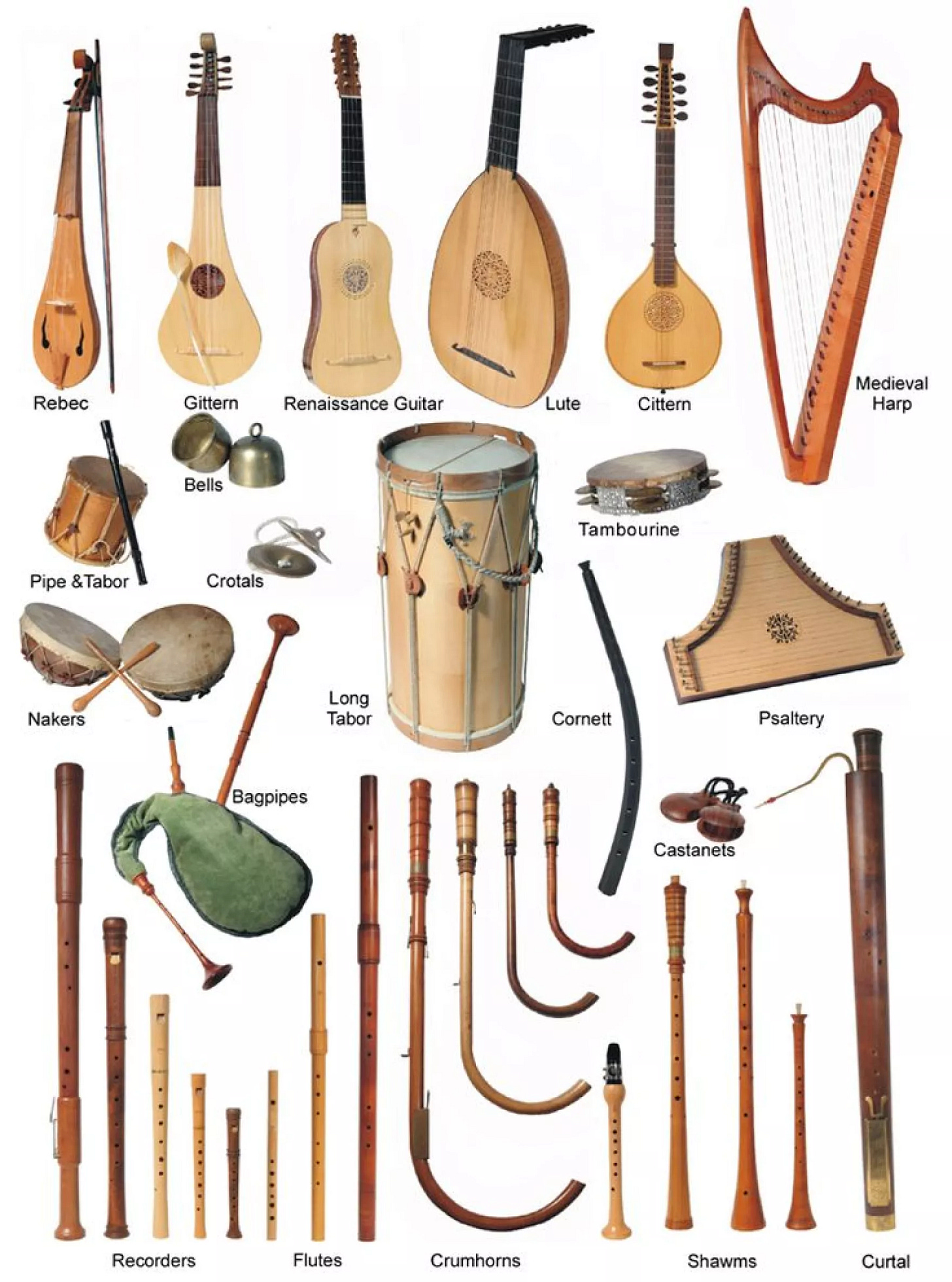Last time we introduced the troubadour tradition, and the troubadours’ broad influences on medieval culture and literature, and on our own. Today we’re going to visit a handful of the most famous troubadours, read their lyrics, and hear their music.
There is a lot of music in this post. I encourage you to open it on the substack website or app, so you can play the music while you read. Click here to do so.
Most of what we know about troubadour songs—they are songs, not poems—comes from a few medieval songbooks. Often, only the lyrics survive. Musical notation back then was basic, showing pitch changes but not tempo, rhythm, or instrumentation.

While some melodies remain, the music of the era was mostly based on modes, not the major/minor keys we know from modern music, so the melodies may sound strange to your ear if you are not used to early music. Most of the songs below have surviving melodies. The lyrics below are translations, with all the ambiguities that implies.
The first troubadour
The first troubadour for whom we have historical record is William IX of Poitiers (1071-1126). He was the Duke of Aquitaine, ruler of about a quarter of what is now modern France, so he was powerful. And witty, and complicated.
He was first married to Ermengarde of Anjou, then Phillipa of Toulouse, but in 1118 he was excommunicated (for the 2nd time!) for “kidnapping” (apparently with her approval), Dangereuse (or Dangerosa), the wife of one of his vassals. His wife Phillipa was away at the time and returned home to find her husband’s mistress installed in Maubergeonne Tower in their castle. She fought this, and lost. If you read our How to Solve a Problem Medieval Style, you may recall that William had a son from a previous marriage, Dangereuse had a daughter from a previous marriage, and William and Dangereuse decided to marry them to each other. They had a daughter, who was Eleanor of Aquitaine, the mother of Richard the Lionheart.
Eleven of William’s songs survive. William apparently had a sharp wit, and a number of sarcastic barbs launched against his enemies are recorded. Some of his songs are sweet and romantic, but he had a reputation as a womanizer; many of his songs reflect that. Last week, I promised you a bawdy lyric. Here you are: Farai un vers, pos mi sonelh. If mild obscenities bother you, sit this one out. The setup: William finds himself in the company of two beautiful noble ladies, and he pretends to be deaf and dumb. The ladies want to have sex with him, thinking he cannot “tell on them”. To confirm it, they put a cat on William while he is undressed, then make the cat scratch him, to see if William cries out. Our hero remains silent, of course. Then:
You shall hear how much I fucked them:
a hundred and eighty-eight times,
so much that they almost broke my equipment
and my tool;
and I can't describe the aching, so much I was taken.
Monet, you shall go in the morning,
bringing my verse in your purse,
straight to the wife of Ser Guari
and of Sir Bernat,
and tell them, for the love of me, to kill the cat.1
He also wrote A Song about Nothing2, which feels extremely modern in a Waiting for Godot kind of way.
William's father, William VIII, fought in the Reconquista, the Christian effort to reclaim Spain from Muslim rule. At the Battle of Barbastro, over 2,000 female slaves were captured, many who were qiyan3, a class of female Arab singers. It’s likely some were brought back to Poitiers, influencing William IX—a topic for a future post.
Medieval Instruments
You will hear many instruments in the music that follows, some perhaps unfamiliar. The troubadour music only survives in lyrics and melodies. Everything else you hear is a reconstruction or an interpretation; we can’t be sure how close these are to the performances of the day. In the following you may hear flutes, drums, lutes, and harps. You may also hear bagpipes (known as far back as the Bible! and played in Spain in this era), the hurdy-gurdy (sometimes called a vielle à roue, an instrument that makes drone sounds), gitterns (an ancestor of the guitar), a psaltery (an ancestor of the zither), or a rebec (an ancestor of the violin). These are all instruments of the era and often show in medieval illustrations of performances, so it is not a stretch to imagine their use in troubadour performances.
Some other famous troubadours & troibaritz
Marcabru (c. 1110–1150): Marcabru was one of the earliest troubadours, his songs a mix of troubadour romance, criticism of courtly love (consistency is the hobgoblin of little minds!), calls to crusade, and sharp political satire. He was in the court of William X, the father of Eleanor of Aquitaine. The following song is a verbal jousting match between a lecherous knight and a shepherdess refusing his advances.
“Girl,” I said, “sweet pious child,
I have detoured from my way
To keep you company this day.
I reckon it a thing ill-styled
That in this place, remote and wild,
You tend so big a flock as this
All alone, companionless.”
“My lord,” she said, “whatever I be,
Folly and sense I can discern.
Your company, good sir, I spurn
And leave it to your lady. She
Has more right to the thing than me—
Your luckless lady who believed
She had it, but is quite deceived.”4
Jaufre Rudel (early 12th century–1147): Jaufre was a nobleman troubadour, perhaps best remembered for his concept of amor de lonh or "love from afar," which became a common troubadour trope. He likely went on the Second Crusade with Eleanor of Aquitaine and Louis VI of France. The Vida of Jaufre Rudel, a contemporary document, reads thus.
Jaufre Rudel of Blaya was a very noble man, and lord of Blaya. He fell in love with the countess of Tripoli, sight unseen, because of all the good things that he heard pilgrims tell of her on their way back from Antioch. He made many songs about her with good melodies but poor lyrics. Out of desire to see her, he took up the cross and went to sea, but was taken ill while on board and was brought, near to death, to an inn in Tripoli. This was made known to the countess, and she came to his bed to see him, and took him into her arms. And he, having realized that she was the countess, at once recovered the faculties of hearing and smell, and praised God who had sustained his life until he could see her; and so he died in her arms. And she had him buried with high honors in the house of the Templars, and became a nun that same day out of grief over his death.
It is easy to draw a straight line from this biography, perhaps legendary, to tragic romances like Romeo and Juliet.
During May, when the days are long,
I admire the song of the birds from far away
and when I have gone away from there
I remember a love far away.
I go scowling, with my head down
so much that songs and hawthorn flowers
aren't better, to me, than the frozen Winter.
I trust the Lord's fairness
in having formed this faraway love,
but for each consolation I achieve
I get two ills, because I am so far away.
Ah! Why didn't I go there as a pilgrim,
so that my staff and hooded cloak
would be beheld by her beautiful eyes!5
The Moorish influence on this performance is clear, especially about halfway in—a topic we’ll revisit.
Bernart de Ventadorn (c. 1130–c. 1190): Bernart de Ventadorn was one of the most celebrated troubadours of his time, and his songs are the traditional songs of courtly love, often unobtainable love. By legend, he was a servant at the court of Ventadorn, and was favored by the lord for his singing. He of course fell in love with the lord's wife and was banished. He later was attached to the court of Eleanor of Aquitaine.
Can vei la lauzeta mover is one of the most famous troubadour songs. The lyrics and melody survive in a period songbook; some claim it inspires passages in Dante’s Divine Comedy. The famous poet Ezra Pound translated it but I prefer this one by A. S. Kline.
When I see the lark display
His wings with joy against the day,
Forgetting, fold then fall away,
As sweetness to his heart makes way,
Such great envy then invades
My mind: I see the rest take fire,
And marvel at it, for no way
Can my heart turn from its desire.
Ah, I so dearly wished to know
Of love, yet so little learn,
For I cannot keep from loving her
Who will not have me, though I burn.
She stole my heart, and all of me,
And she herself, and worlds apart;
Lacking herself, now nothing’s left
But longing and the willing heart.6
It is a classic troubadour song of unrequited love, verging on modern teenage mopey angst. This performance by Beatus seems to me a beautiful and historically justified performance.
Here’s another one with a vielle (medieval fiddle) and a hurdy-gurdy.
OK, I realize this post has gotten quite long. We have a few more troubadours to cover, and some videos showing some different performance styles, but that will wait til next week.
http://trobar.org/troubadours/coms_de_peiteu/guilhen_de_peiteu_05.php
http://trobar.org/troubadours/coms_de_peiteu/guilhen_de_peiteu_04.php
https://en.wikipedia.org/wiki/Qiyan
The rest here, translation by Joseph S. Salemi:
https://classicalpoets.org/2017/09/15/translation-of-marcabru-by-joseph-s-salemi/
From Dawn to Dawn - Troubadour Poetry, by A. S. Kline






